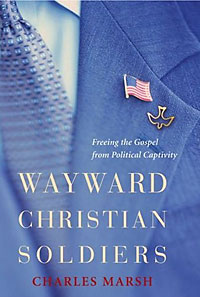Book Notes
 Charles Marsh, Wayward Christian Soldiers; Freeing the Gospel from Political Captivity (New York: Oxford University Press, 2007), 243pp.
Charles Marsh, Wayward Christian Soldiers; Freeing the Gospel from Political Captivity (New York: Oxford University Press, 2007), 243pp.
In his essay "Evangelical Theology in the Nineteenth Century," the Swiss theologian Karl Barth (1886–1968) described "a certain black day" in August 1914 when he was shocked to learn that ninety-three German theologians and writers, many of them his seminary professors and including Adolf von Harnack, had signed a document endorsing the war efforts of Wilhelm II. Fast forward to the so-called "Land Letter" (October 3, 2002) in which five prominent evangelical leaders supported Bush's pre-emptive invasion of Iraq (Richard Land, Charles Colson, Bill Bright, James Kennedy, and Carl D. Herbster). In fact, a Pew poll of April 2003 indicated that 87% of white evangelicals supported the invasion.
In fairness, many evangelicals opposed the war and the broader identification with Bush (cf. Jim Wallis). Charles Marsh, professor of religion at the University of Virginia, was one of them. It would be nice to believe that by now conservative evangelicals have been duly chastened and that his book is no longer necessary (cf. David Kuo, Tempting Faith; An Inside Story of Political Seduction, New York: Free Press, 2006), but that's probably wishful thinking. The identification of the Gospel with American exceptionalism remains a disturbing example of the cultural captivity of the church and a perennial temptation. Even though the resounding defeat of Bush by Obama now dates his book, Marsh's jeremiad and lament remains a sobering analysis of the "colossal wreck" of the evangelical witness.
In their Faustian bargain, evangelicals gained political power and betrayed the Gospel: "We have turned God into an appendage of the American way of life, acted with utter contempt toward the global evangelical and ecumenical church, and at times even presumed that the military powers of our nation act in vicarious representation of Jesus Christ the Lord." Marsh points readers to more reliable witnesses, with heavy doses of Barth and Bonhoeffer. He commends the likes of Will Campbell, Reinhold Niebuhr, Paul Tillich and others (but who would want Calvin's Geneva?!) for ways of addressing conformity, compromise, and accommodation. In the last part of his book Marsh recommends a "trinity of spiritual dispositions" — silence, stillness and waiting, accountability to global Christianity (Philip Jenkins and Lamin Sanneh), and dissent as "a vital part of confessing Jesus Christ as Lord.


